Under trying conditions in new surroundings, he formed an unbeatable alliance with LeBron, keeping the King accountable while proving to be the cheat code that propelled the Lakers to their 17th title.
From the moment Kobe Bryant laced up his shoes as they worked out together in the summer of 2018, Anthony Davis could tell that the Lakers legend meant business.
Bryant, who in retirement would often share his wisdom with select up-and-coming stars in offseason training sessions, had devised a regimen for working with Davis. When they met in Los Angeles that summer, Kobe wasted no time. “I’m pretty sure he watched some tape before I got there, because he had a little plan of what he wanted to do,” says Davis. Bryant ran AD through a battery of drills, working on ballhandling, teaching his signature turnaround fadeaway and, most notably, improving Davis’s footwork in the post. After Kobe barked orders, the two would then break down film together.
Those summer sessions left an indelible impression on Bryant. He had never put much effort into recruiting big names to Los Angeles during his 20-year playing career, which ended in 2016. But not long after the minicamp, Kobe picked up the phone and called the godfather of his daughter Gianna—his former agent and current general manager of the Lakers, Rob Pelinka. “Hey, you know I don’t give you GM advice,” Bryant said. “But if you ever get a chance to get this guy, he is the avatar of what you want. His level of footwork, his dexterity, his mastery of the details of the game. Guys like this are generational players.”
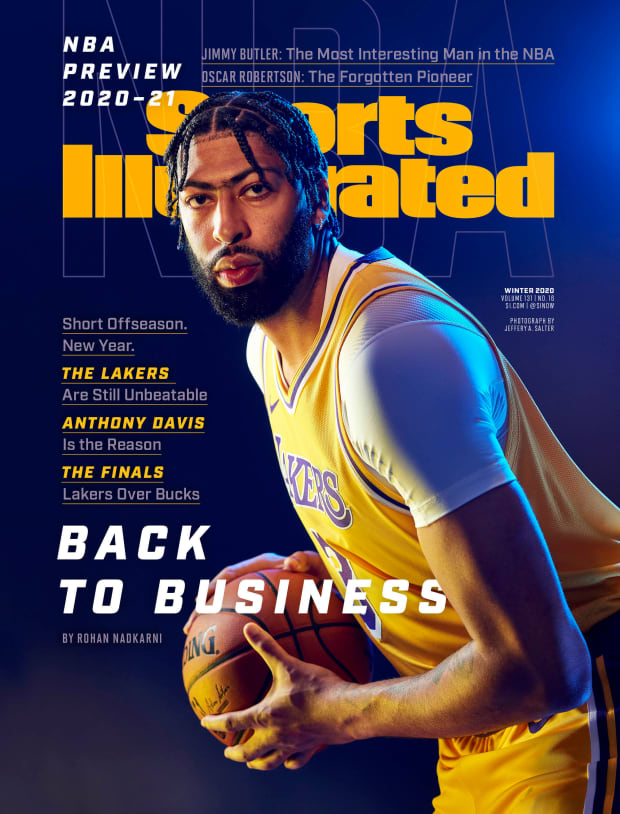
At the center of every conversation about why the Lakers are the defending NBA champions is Anthony Davis. The god who created Kevin Durant decided to get a little more imaginative for his masterpiece, a 6' 10" big man with the skills of a guard, the defensive instincts of a lioness protecting her cubs and the agility of Baryshnikov. As the league found out last season, if you want to win a championship, you need an answer for AD. “His ability and what he does on the floor, it doesn’t even seem like he’s trying at times,” says LeBron James, with a slight whisper of awe in his voice. “He’s just that damn talented. One game he had 40 and 20, and as teammates we couldn’t believe it. It seemed like he didn’t even sweat.”
Davis also happens to make life way easier for his GOAT-adjacent teammate. James’s initial season in Hollywood was marred by the first significant injury of his career (a strained groin that cost him 27 games), an awkward relationship with his coach (Luke Walton) and an uneasy alliance with the team’s young core (some of whom were serenaded by opposing fans with “LeBron’s going to trade you!”). Questions cropped up following a 37–45 season that saw James miss the playoffs for the first time since 2005: Was LeBron on the downswing? Could management put the right pieces around him? Did any other stars actually want to join him in L.A.?
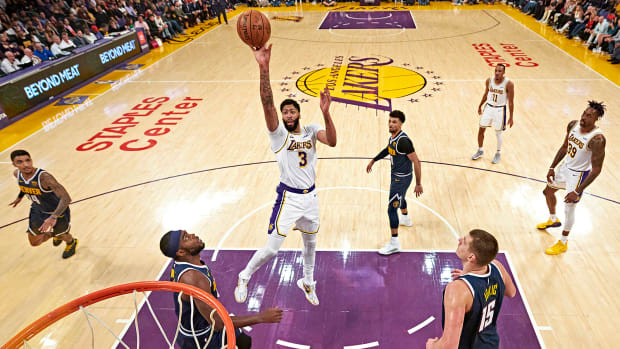
For all the internal motivation those doubts provided James, his Washed King hashtag was going to spur him only so far. In July 2019, Pelinka heeded Kobe’s advice and swung a massive trade for Davis. More than a year ahead of his free agency, Davis made it clear L.A. was where he wanted to end up. His agent, Rich Paul, had basically dared the Celtics to acquire him from the Pelicans and then watch him walk away after one year. To get this generational talent, Pelinka gave up a bounty of three players and three first-round draft picks. In return he got someone who not only could play alongside James at the level he demanded, but who would also hold him to that same standard in a way his recent teammates couldn’t.
Whether it was pointing out a missed rotation, asking James to pick up a certain assignment or calling for a more forceful box-out, from the start of training camp Davis coaxed out a more committed defensive effort from James, an aspect of his game that had become the easiest fodder for his critics. “It showed me he wanted more for his career,” James says. “It’s something we talked about before we even stepped on the floor. In order for us to become the team we want to become, it starts and ends with us. From that very first practice he held me accountable.”
“I’ve never had a problem challenging anyone on the floor,” Davis says. “And Bron makes it easy, because he always wants to get better. And if the two best players on the floor are able to challenge each other, then the other guys will see it. There’s no, Why is he getting on me?”
Davis’s ability to check LeBron respectfully in front of the rest of the team not only filtered down to the role players, it also made life much easier for Frank Vogel, who succeeded Walton and took on the often-thankless task of trying to lead a newly minted superteam. Vogel made his name with the Pacers as a defensive coach, and Davis’s passion on that end of the floor was invaluable. “The staff can only push a team so far,” Vogel says. “Anthony’s willingness to push, LeBron’s willingness to accept it and also Anthony’s willingness to accept LeBron pushing him—the two of them had a great synergy that helped our group reach an extraordinarily high level of play.”
James has had complicated relationships with costars previously. In Miami, he and Dwyane Wade struggled to coexist until Wade ultimately accepted second billing. In Cleveland, Kevin Love was the subject of subtweets while Kyrie Irving eventually forced his way to Boston—and out of James’s shadow—a year after they brought the Cavaliers their first title.
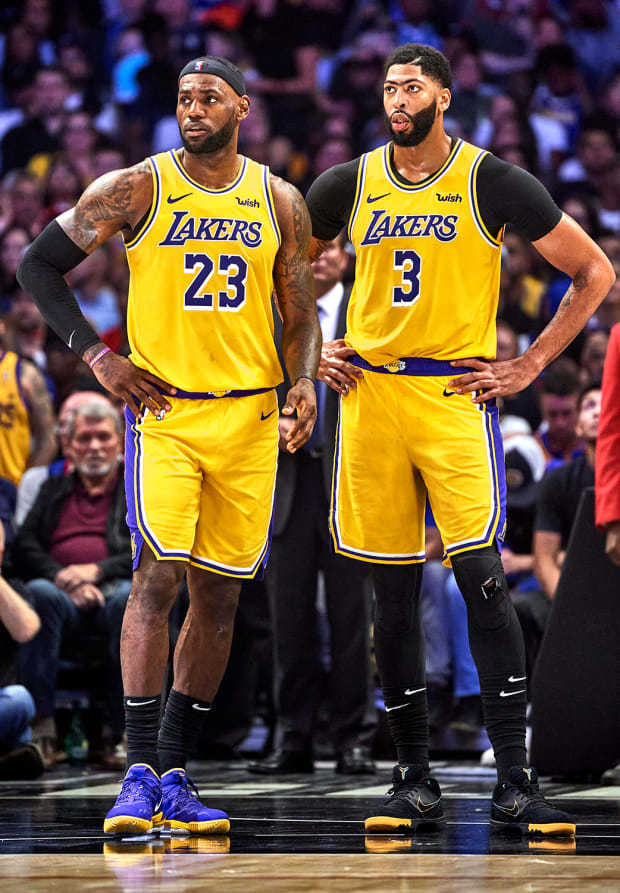
AD and Bron, though, are a natural fit, functioning neatly as a pick-and-roll pair. Off the court they’ve enjoyed a friendship since their first experience as teammates on the 2012 Olympic team, when Davis was a 19-year-old who had just been selected No. 1 by the Pelicans and James was a 27-year-old coming off his first title. After Lakers practices, they’d join forces in three-point competitions. Between games, they’d spend time at each other’s houses drinking wine, celebrating Taco Tuesday and watching movies like Life, Coming to America and Friday. There’s still rarely a day that goes by that they don’t talk to each other.
Even after spending an inordinate amount of time together in the Orlando bubble, the two haven’t needed space during their truncated offseason. Whether it’s LeBron attending the birthday party for Davis’s young daughter, Nala, or playing the hits on the dinner menu at Nobu (including LeBron’s favorite, the yellow-tail sashimi with jalapeño), James and AD can’t seem to get enough of each other. “It’s almost like LeBron is the big brother,” says Davis’s father, Anthony Sr.
Of course, it doesn’t matter if James and Davis are finishing each other’s sentences if they aren’t taking care of business on the court. And they did, bringing Los Angeles its first title since 2010 as James led the league in assists for the first time and Davis became the first of the King’s teammates to outscore him.
Before his trade to L.A. and with his basketball future up in the air, Davis was fixated on finding ways to improve. Early last summer he called Mike Penberthy, then an assistant coach with New Orleans, and asked for help fixing his jumper. Penberthy broke Davis’s shot all the way down. He needed to make sure Davis would stop drifting left when rising up, particularly when catching the ball on the run. He had to make sure the ball was leaving Davis’s hand off the correct fingertips. And he wanted to see proper backspin.
“Those were a hard couple months,” says Penberthy, who joined Vogel’s staff two weeks after the Davis trade. “It can get ugly. These are major adjustments, and you have to get worse before you can get better. If you’ve ever changed anything in your life, you know you have to ride through the discomfort. Early in the season I thought, This could go south if he has a couple bad games.”
Davis fought through the awkwardness; his coaches insisted that he keep firing even if he was having an off night. That shoot-without-thinking mentality was never more apparent than at the end of Game 2 of the Western Conference finals, against the Nuggets. The Lakers were trailing by one with 2.1 seconds left and the ball out under Denver’s basket. Davis darted toward the left wing, caught an inbounds pass and launched a 26-footer without hesitation. It was the kind of shot Davis dreamed of taking as a kid growing up in Chicago, when he was alone with a hoop and had to pretend to be the announcer, the crowd and the shooter all by himself. Here, in the bubble, his balance was perfect. The ball left his hands cleanly. The backspin ripped the net as the ball swished through. Game over, Lakers up 2–0. “I feel satisfied when he makes a free throw, right?” Penberthy says. “That shot? I mean, it’s icing on the cake.”
As he celebrated, Davis let out a guttural yell of the first word that came to mind: “Kobe!”
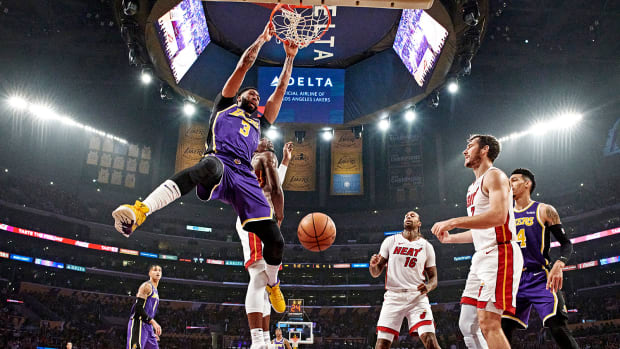
As much as Davis’s shooting touch makes him a threat, it’s what he does on defense that unlocks the Lakers, forcing opposing coaches to contort their offenses like balloon animals. During one of the first meetings of Vogel’s staff, Penberthy drew odd looks when he repeatedly suggested that the other defenders should stay at home whenever Davis was near the paint, even if that meant letting someone like James Harden drive into the middle of the floor. When he seems to be beat, Penberthy argued, Davis’s hops and 7' 6" wingspan allow him to erase almost any mistake at the rim. A couple of games into the season, assistant coach Jason Kidd walked up to Penberthy, put his arm around him and said, “You’re right, that sucker can get to everything.”
Davis was the most important piece of the team Vogel wanted to build, one that finished third in the league in defensive efficiency. During the regular season, the Lakers often played lineups with traditional centers Dwight Howard and JaVale McGee on the floor before downsizing with Davis at the five to close out games. Vogel wanted a team experienced in different styles of basketball come playoff time but, he notes, playing that many styles can be done only with a unicorn like Davis, a player who can do everything from switching onto a red-hot shooter like Jamal Murray to banging with 284-pound Nikola Jokić in the post, as Davis did in the Western Conference finals. “Yes, Bron is a freak,” says veteran Lakers forward Jared Dudley. “But the reason the Lakers are so versatile is because of Anthony Davis.”

After Jimmy Butler delivered an offensive performance for the ages (40 points on 20 shots with 13 assists) in Game 3 of the Finals to cut the Lakers’ lead to 2–1, Vogel knew he needed to switch his coverage on the Heat’s star. He decided the best counter to Butler would be to guard him with size, which would mitigate his ability to score in the paint and force him to become a jump shooter. Vogel presented the plan to James and Davis and asked them to figure out who should get the assignment. Both were willing to take on the task of slowing down Butler, but Davis won the argument. “We were already asking a lot of LJ to score, playmake, get other guys going,” Davis says. “Coach talked to us about it, so I told him I would take the challenge. I’m not afraid to guard anybody.”
With Davis checking him from the opening tip, Butler went from a 40-point outburst in Game 3 to a 22-point effort in Game 4. AD’s lateral quickness—and the footwork Kobe had once raved about—prevented Butler from penetrating in the paint and parading to the free throw line. The Heat’s offense looked hesitant. And while Davis’s offensive numbers (22 points on 8-of-16 shooting) were pedestrian by his standards, he was a team-best plus-17. “He’s not looking for credit—he just wants to do the work,” Pelinka says. “He takes pride in being able to shut the water off of any player on the other team’s roster. And that attitude becomes pervasive.”
After Miami’s victory in Game 5, Vogel made another adjustment, starting Davis at center for the first time in the series. Immediately, he denied access to the lane in a way his coaches hadn’t thought was possible in the preseason. Watching Heat players try to attack to the rim was like watching drivers try to speed on the 405 during rush hour, slamming on the accelerator even though there’s nowhere to go. Miami’s offense cratered. The Lakers led 64–36 at halftime, the franchise’s 17th championship secured in those 24 minutes of suffocating defense.
When the final buzzer sounded Davis became emotional, thinking of all the work he put in—his sweat sessions with Kobe, changing his shot from the ground up, finding his way out of the city that drafted him to a franchise that could deliver him what he wanted. During the trophy celebration, he predicted that Anthony Sr. would be crying soon, and he was right. It was an emotional moment, but not a surprising one, for the Davises. “Anything I do I expect it to happen,” Davis says. “You work for a reason. You grind for a reason. It’s to get to these points. You embrace all the long hours in the gym and in the weight room. It all paid off. “I don’t look at it like, This is surreal. I look at it more as, I should be here.”
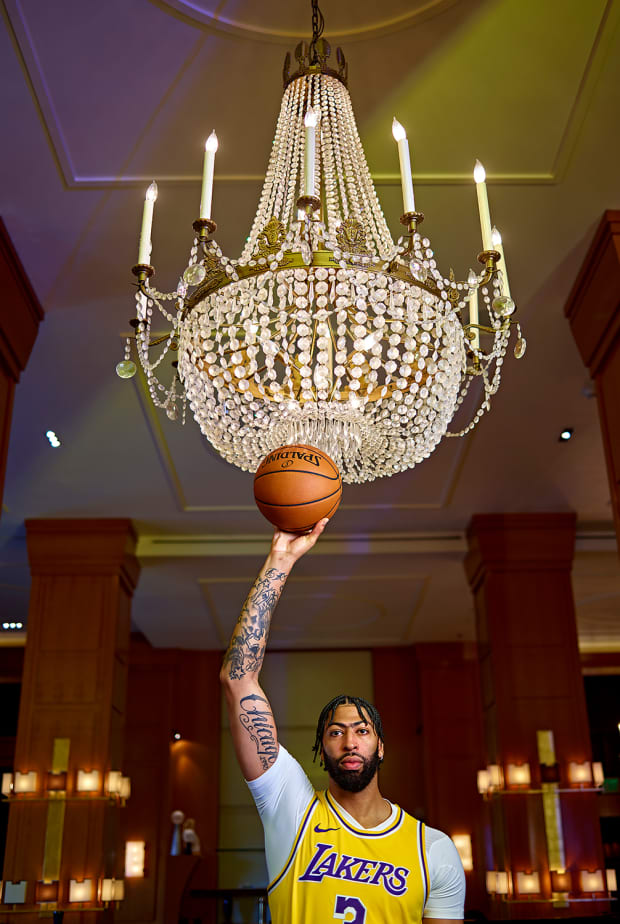
The lakers will play their first game of the 2020–21 season just 10 weeks after their 2019–20 finale. Chemistry will be paramount, with the short lead time into the season forcing teams to start the year without the typical preseason acclimation process.
Even though L.A. has turned over a substantial chunk of its roster, there’s every reason to believe Davis and James will be able to build the Lakers into a tight-knit group. It’s what they did last year, unlike the Clippers and Rockets, star-powered outfits that crumbled in the bubble and have made significant changes since the end of the season. In Orlando, Lakers players often found themselves spending time in James’s or Davis’s suite, and not just because they had the biggest rooms. The players would also get together for birthdays, Monday Night Football, UFC fights, Verzuz battles, breakfast at the Three Bridges restaurant or the team’s Madden tournament.
When they played Madden, James—who took the competition seriously, practicing in between games—drew the ire of his teammates because he insisted on using the same play over and over, with Buccaneers running back Ronald Jones II. Dudley was among those who called James out, but the King was having none of it. “I had a great team. I had a great running back, and I had a great play that a lot of guys in our league couldn’t stop,” LeBron says. “If it’s not broke, don’t fix it.”
James was playing Madden the same way many people like to use LeBron in video games—by giving the same guy the ball over and over. With Davis around, that’s no longer the best way to use James, virtually or in real life. The combo of James and Davis—who recently signed a five-year, $190 million contract extension—gives the Lakers a massive margin of error everywhere else on the roster. It doesn’t matter if the shooting is light, or if the center rotation is inconsistent. An NBA team would be lucky to have one player who could slow down James or Davis. How are they supposed to find two?
“AD has always been a massive matchup problem, even when he was in New Orleans,” Dudley says. “The difference is that he’s paired with LeBron James. If you load up on AD, you now have the best passer on the floor in LeBron who can unlock everybody else. You were already not going to find anyone to guard Anthony Davis. You just have to have multitalented players
everywhere, and then you have to have the chemistry to put it all together.”
If Davis’s versatility is what makes the Lakers so dangerous, he’ll end up with a sizeable target on his back. It’s a position he cherishes. “I have to make sure I’m prepared for any defense people throw at me, but I take it as an honor for teams to have to build their roster around me,” he says. “It’s an honor to be a guy teams have to figure who to go get or trade for or whatever to match up against. It makes you want to work on your game even more.”
Davis has shown he has the ability—and the desire—to add even more elements to his freak-ishly well-rounded arsenal. The generational players always mean business.